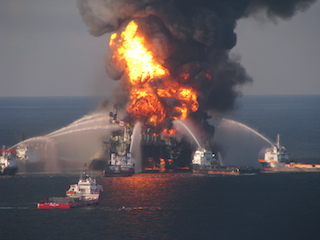Institutional investors who bought up BP stock in weeks after the April 2010 Deepwater Horizon disaster can proceed with their lawsuit, alleging that BP’s misrepresentations of the ensuing spill cost them $2.5 billion, a federal appeals court ruled.
The U.S. Fifth Circuit Court of Appeals in New Orleans upheld a Houston judge’s ruling that the institutional shareholders’ case can move forward as a class action, despite BP’s arguments that it did not meet qualifications.
The class is limited to institutions that bought BP shares in the form of American depository receipts (ADRs) between April 26 and May 28, 2010. Those plaintiffs argue they bought into BP believing company management’s early public estimates of the spill volume, before the true volume and extent were revealed.
The resulting 40% plunge in BP stock value collectively cost them $2.5 billion in losses, the plaintiffs contend.
Excluded from the action are investors who bought BP stock before the Macondo blowout. That claim posited that shareholders were misled about changes to BP’s safety culture and its ability to respond to emergencies after a fatal 2005 Texas refinery fire. But the three-judge appeals panel rejected their standing.
This spring the fifth anniversary of the disaster that killed 11 workers and wreaked havoc along the Gulf of Mexico focused attention on new safety rules and procedures in the offshore industry.
Meanwhile, BP continued to wade through legal claims remaining from the spill. Just two months before the appeals court certified the institutional investors’ class action, BP settled with government entities for $18.7 billion in damages, on top of $11 billion that went out earlier to private claimants.
BP’s earnings statement July 28 pegged the overall cost of Deepwater Horizon to the company at $54.6 billion.




